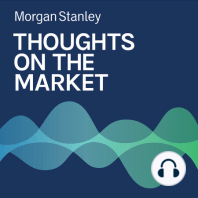3 min listen

Ellen Zentner: The Lagging Effects of Loan Growth
Ellen Zentner: The Lagging Effects of Loan Growth
ratings:
Length:
3 minutes
Released:
Apr 6, 2023
Format:
Podcast episode
Description
While banking conditions seem to have stabilized for now, tighter credit conditions could still hit U.S. economic growth.----- Transcript -----Welcome to Thoughts on the Market. I'm Ellen Zentner, Morgan Stanley's Chief U.S. Economist. Along with my colleagues bringing you a variety of perspectives, today I'll discuss how recent developments in the banking sector could impact the U.S. economy. It's Thursday, April 6, at 10 a.m. in New York. Events over the past several weeks have led to disruptions in the financial system that we believe will leave a mark on the real economy. Our banking analysts here at Morgan Stanley Research see permanently higher funding costs for banks going forward, and that will likely lead to tighter credit conditions beyond what was already embedded in our previous baseline for the economy. At its March meeting, the Federal Open Market Committee explicitly added a reference to tightening credit conditions and the effects on growth and inflation. But in the press conference, Chair Powell also highlighted wide uncertainty around the magnitude of tightening. The lack of visibility into the extent and persistence of current bank funding pressures, as well as the banking systems response, are contributing to this uncertainty. Our banking analysts believe that higher operating costs should drive tougher standards for new loans and higher loan spreads. These drivers set the stage for an even sharper deceleration in credit growth over the course of this year. Put simply, when it's more difficult or expensive for businesses and consumers to borrow money, it creates challenges for economic growth. While our baseline forecast for the U.S. economy already included a meaningful slowdown in loan growth over the coming months, further tightening in lending standards and greater pullback in bank lending will weigh further on GDP. That said, our modeling shows the effects are likely to take some time to build, with a meaningful slowing starting in the third quarter of this year and the largest impact occurring across the fourth quarter of 2023, and the first quarter of 2024. We think the impact of tighter credit on consumption and business investment is roughly equal, though we expect that the effects on business investment will likely peak in the fourth quarter of this year, one quarter ahead of consumption. On the back of this analysis, we've lowered our forecast for U.S. GDP growth this year and now look for 0.3% growth on a Q4 over Q4 basis. That's 1/10 lower than where we had it prior to the emergence of these new bank funding pressures. For next year we took our GDP forecast down by 2/10 to just 1%. Again, because it takes time for the cumulative impacts to build, we see the largest impacts as we're moving into 2024. So to sum up, the risk to the U.S. economic growth outlook and the labor market are large and two sided. A quicker resolution of financial system troubles could help keep the economy on solid footing, in line with recent monthly payroll data, which has been resilient. On the other hand, more volatile financial conditions from here could see a larger and more rapid deterioration in growth and the labor market. For now, banking conditions seem to have stabilized, which has given investors a bit of relief. Thanks for listening. If you enjoy the show, please leave us a review on Apple Podcasts and share Thoughts on the Market with a friend or colleague today.
Released:
Apr 6, 2023
Format:
Podcast episode
Titles in the series (100)
Andrew Sheets: For Markets, Signs, Signs, Everywhere Signs by Thoughts on the Market